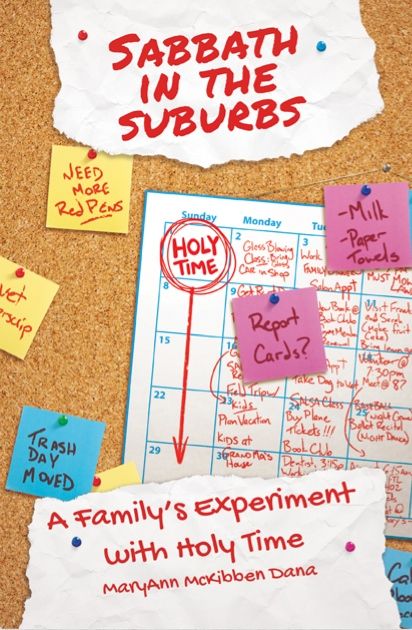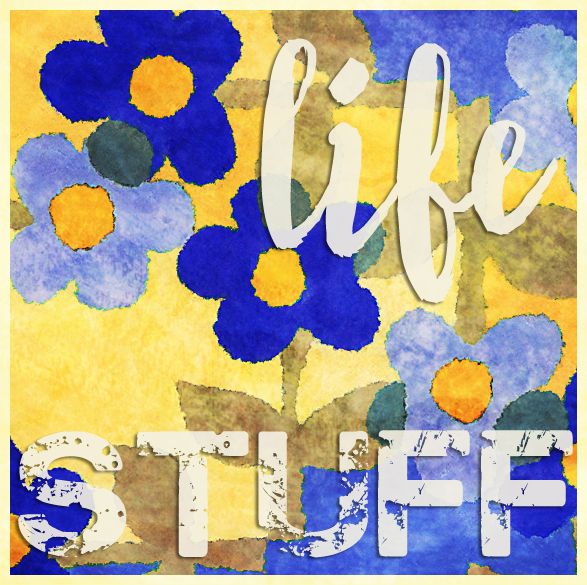You can find MaryAnn at The Blue Room Blog
 Inspiring and practical! This truly is a book [xii] "...for anyone who wants to learn to live at a savoring pace." Inspired by a visit to Iona, PC(USA) pastor MaryAnn McKibben Dana spent twelve months from September 2010 through August 2011 (literally) practicing keeping a weekly sabbatical day with her spouse and their three kids. "Sabbath" means to stop, to cease work and worry; keeping sabbath means bringing life back into balance by living fully and simply in this present, gifted "now," if only for 24 hours, 12 hours, or another measured segment of chronological time.
Inspiring and practical! This truly is a book [xii] "...for anyone who wants to learn to live at a savoring pace." Inspired by a visit to Iona, PC(USA) pastor MaryAnn McKibben Dana spent twelve months from September 2010 through August 2011 (literally) practicing keeping a weekly sabbatical day with her spouse and their three kids. "Sabbath" means to stop, to cease work and worry; keeping sabbath means bringing life back into balance by living fully and simply in this present, gifted "now," if only for 24 hours, 12 hours, or another measured segment of chronological time. Like MaryAnn, I'm also a city girl, accustomed to, often enamored with noisy (in every sense: high decibel, dissonant sounds; savory tastes; intense, colorful sights; interesting smells; varied natural and humanly-created texture) surroundings, uncomfortable with silence. Full of discomfort about being physically alone, by myself. I've also been spending a lot of time with memories of past achievements and experiences (some of that's essential in my current phase of discerning what's next in my life), as I imagine the venue and the shape of future activities and happenings (also necessary if that future's going to arrive). However, to counter that, I need the sense and the reality of [117] "Sabbath [which] is about ... delighting in the sacred ordinary that's always around us ... being grounded in relationships and in place," along with the work of Sabbath, "Play without Purpose" [139]. Sabbath is about living here and living now.
 The author writes and lives from a Christian perspective, but almost anyone of any or no religious, theological, or spiritual persuasion could benefit from taking twelve months to practice keeping sabbath one day each week. I loved the easygoing, easily readable pace of the narrative as it moved month by month beginning with September, the traditional start of the academic year. Your starting point "new year" could be the first Sunday of Advent, January 1, Lunar New Year, or any ethnic, cultural new year. Or invent and announce your own. I'm planning to set my own date to begin and journal through twelve months of Sabbath in the City; I'll be posting a monthly blog, as well. MaryAnn has filled this book with useful examples from her own life, and brings dozens of relatable quotes from other writers, including Abraham Joshua Heschel, Henri Nouwen, and Wayne Muller.
The author writes and lives from a Christian perspective, but almost anyone of any or no religious, theological, or spiritual persuasion could benefit from taking twelve months to practice keeping sabbath one day each week. I loved the easygoing, easily readable pace of the narrative as it moved month by month beginning with September, the traditional start of the academic year. Your starting point "new year" could be the first Sunday of Advent, January 1, Lunar New Year, or any ethnic, cultural new year. Or invent and announce your own. I'm planning to set my own date to begin and journal through twelve months of Sabbath in the City; I'll be posting a monthly blog, as well. MaryAnn has filled this book with useful examples from her own life, and brings dozens of relatable quotes from other writers, including Abraham Joshua Heschel, Henri Nouwen, and Wayne Muller. As much as I enjoy reading and pondering heavyweight theology, I need books and conversations like Sabbath in the Suburbs that will help me (slowly learn to) live closer to creation, more authentically with others and with myself. Those of us familiar with the Hebrew scriptures know Genesis 2:2-3: "And on the seventh day God finished the work that he had done, and he rested on the seventh day from all the work that he had done. So God blessed the seventh day and hallowed it, because on it God rested from all the work that he had done in creation." God calls us, and in the Spirit empowers us, to work as co-creators, co-re-creators of creation. But even more so, sabbath is for us because we no longer are slaves, no longer bound to labor and toil 24/7. Deuteronomy 5:15, "Remember that you were a slave in the land of Egypt, and the Lord your God brought you out from there with a mighty hand and an outstretched arm; therefore the Lord your God commanded you to keep the sabbath day."
Most of us attempt to "practice resurrection," to live "as if," "fake it till we make it." MaryAnn assures us [23-24] acting "as if" we've achieved the fullness and completeness of a full day of sabbath rest is not lying, not pretending, but rather it is "an act of hope."
my amazon review: inspiring and practical

Thanks for your review - I quite agree!
ReplyDelete